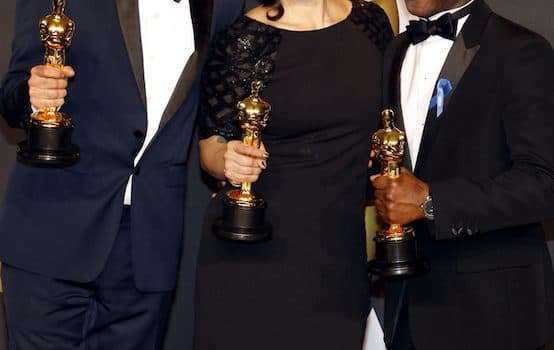
By now we have come to expect that glamorous award ceremonies will be as much about politics as movies. And while the black dresses might have been given the heave-ho, Oscar night 2018 did not venture off-script. The current crop of actors-turned-activists were in full campaigning zeal, offering up lectures not just on #MeToo and sexual harassment but on the importance of diversity in the film industry. Pure coincidence, then, that the viewing figures were the lowest ever recorded. Oddly, it seems that those at home watching tend to prefer Hollywood stars to stick to entertainment rather than lectures.
The award for capturing the political zeitgeist most successfully went to Frances McDormand, star of Three Billboards Outside Ebbing, Missouri. McDormand, on stage with Jodie Foster on crutches (natch!), accepted the award for best actress and used her speech to call for more diversity in the film industry. She asked all the female nominees present to stand up and then called on producers to back their projects (assuming, of course, that their “project” is not just to act). McDormand brought her speech to a climax with two words: “inclusion rider.”
If you haven’t heard of inclusion riders before, you can be forgiven. They were first formulated in 2016 by Stacy Smith, founder of the Annenberg Inclusion Initiative at the University of Southern California. The idea was that, in order to tackle the underrepresentation of particular groups in film casting, actors can insist on clauses in their contracts that stipulate cast and crew meet a certain level of diversity. Where once movie stars may have demanded champagne and fresh grapes, a private dressing room or a particular make-up artist, today’s must-have accessory, it seems, is a diversity quota.
We will no doubt hear the phrase “inclusion rider” a great deal more in the months to come as stars insist that both on- and off-screen roles meet their specified targets. Parts will be cast and jobs allocated according to ethnicity, gender, sexuality, or disability—whatever the pet concerns of the all-powerful star happen to be at the time he or she signs the all-important contract.
Proponents of “inclusion riders” argue that they help counter the bias that’s assumed to be ingrained in Hollywood’s auditioning and casting process. Certainly discrimination in the film industry, as in all walks of life, should be challenged. But inclusion riders raise far more problems than they can ever hope to solve.
Most obviously, inclusion riders restrict the artistic freedom of the film director. There may be all kinds of reasons why a movie might not have a diverse cast: a story set in a particular time or place; or a script about the life and experiences of a certain person, family, or community; or a fictional monoculture (think Black Panther). Whatever the explanation, writers and directors need to be free to make these choices.
If actors want to dictate film content, they are in the wrong job—they should test their skills in the marketplace and become screenwriters or film producers. Putting political objectives above an artist’s vision turns films into “teachable moments” not entertainment. Movies become just another thinly veiled opportunity for hectoring the unenlightened masses.
Inclusion riders might give a few out-of-work actors opportunities they wouldn’t otherwise have had. But as with all quotas and other forms of positive discrimination, there will always be the underlying concern that those benefiting wouldn’t have gotten their positions without that extra help. Inclusion riders tell people from listed groups that they cannot get to where they want to be without special treatment. This is a gross insult to the many talented actors from all walks of life who have successfully made careers for themselves in the film industry—especially if they had to fight tooth-and-nail to achieve their success.
I am often invited to speak on panel debates. On numerous occasions I have accepted, delighted that my expertise has been recognized at last and people are interested in what I have to say. Only later does it become clear that my invitation was issued to enable the organizers to tick a box confirming they had a gender-balanced line-up of speakers. So I know that diversity quotas breed insecurity. The men on these panels could rest assured that they were selected to speak because of the interesting ideas they might have to convey. I, on the other hand, was left with the nagging doubt that it wasn’t my work that had earned me the right to speak so much as my biology.
Yet inclusion riders go a step further than diversity quotas. They make casting decisions at the behest of one highly paid celebrity. If a particular star has a penchant for deaf kids, or women of color, or gay men in wheelchairs, then they can use their inclusion rider to insist that people from those groups are recruited. The rainbow line-up of chosen minorities are left in little doubt as to where their gratitude must be directed. This is the most nauseating form of patronage imaginable. Directors worth their salt should show stars with inclusion riders the door.
Joanna Williams is the author of Women vs Feminism: Why We All Need Liberating from the Gender Wars.
Sourse: theamericanconservative.com






